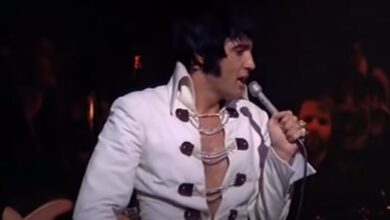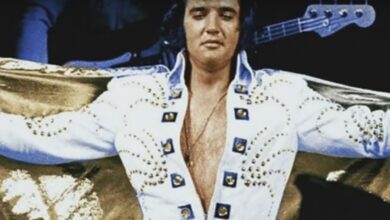This Scene Demonstrates That No One Else Has Had A Voice As Pure And Filled With Such Emotion
Elvis Presley’s interpretation of “Swing Down Sweet Chariot” is an extraordinary representation of his musical journey and his deep-rooted connection to gospel music. Born in Tupelo, Mississippi, in 1935, Elvis grew up in a religious household where gospel music played a significant role. His early exposure to church hymns and spirituals shaped his musical identity, influencing his later work in rock and roll and pop music. Throughout his career, Elvis would often revisit his gospel roots, bringing an authentic emotional depth to his interpretations.
The song itself has a rich history, tracing back to the 19th century and deeply rooted in African American spiritual traditions. It reflects themes of hope, salvation, and divine intervention, which resonate with many listeners even today. This connection to the broader human experience is part of what makes the song so compelling, and Elvis’s rendition harnesses that power beautifully. His ability to convey deep emotions through his performances has often been cited as one of the hallmarks of his artistry.
When he recorded “Swing Down Sweet Chariot” in 1969, it was part of a series of sessions that reaffirmed his commitment to gospel music. These sessions took place during a transformative period in his career, where he sought to reconnect with the sacred elements of his musical upbringing. The years leading up to this recording saw Elvis navigating through the demands of Hollywood and the music industry, but his love for gospel music remained a constant in his life.
In this performance, one can hear the influence of the gospel choir, which adds layers of richness and soul to the song. The choir’s harmony elevates the piece, creating an atmosphere of jubilation and reverence. This collaborative spirit showcases the communal experience often found in gospel music, where individual voices blend together to create a powerful collective sound. Elvis’s voice, strong and emotive, serves as a beacon within this harmony, guiding the listeners through the song’s narrative.
Elvis’s technical skills as a vocalist are on full display, as he moves seamlessly between soft, poignant moments and powerful, soaring crescendos. His distinctive vibrato adds a layer of authenticity, drawing the audience into a shared experience of worship and celebration. His performance is not just a mere rendition of a song; it becomes a heartfelt testimony of faith and hope, inviting listeners to reflect on their beliefs and experiences.
The 1969 rendition encapsulates the essence of the time, marked by social upheaval and change. Gospel music, during this era, served not only as an uplifting force but also as a means of expressing resilience amid adversity. Elvis’s choice to record gospel music during this period aligns him with a tradition that speaks to the struggles and aspirations of countless individuals. His interpretation of “Swing Down Sweet Chariot” thus transcends entertainment, marking his place as a cultural figure who understood the significance of music in human experience.
Fans and scholars alike regard Elvis’s gospel recordings as pivotal for understanding his artistic legacy. The warmth and sincerity in his voice transformed “Swing Down Sweet Chariot” into a heartfelt anthem, one that many regard as one of the finest examples of his ability to blend genres and reach across boundaries. His gospel recordings often reveal a side of him that speaks to his innermost feelings—a vulnerability that adds to his mystique.
Overall, the cultural impact of “Swing Down Sweet Chariot” remains significant even decades after its release. It serves as a reminder of Elvis’s unique ability to connect with audiences through music’s universal language. His performance embodies both a celebration of life and an acknowledgment of the challenges many face, echoing the sentiments expressed in the gospel tradition.
In the broader context of Elvis’s career, “Swing Down Sweet Chariot” helps illuminate his ongoing exploration of identity and spirituality. The song encapsulates his enduring love for the gospel genre, which persisted alongside his rock star persona. Through songs like this, Elvis not only entertained but also inspired generations to explore their own spiritual journeys, solidifying his role as one of music’s most influential figures.
In conclusion, Elvis Presley’s 1969 recording of “Swing Down Sweet Chariot” stands as a powerful testament to his artistry and the lasting influence of gospel music. Through this remarkable performance, Elvis not only showcases his exceptional vocal talent but also expresses the soulful connection he felt with the genre, ensuring that “Swing Down Sweet Chariot” remains an iconic piece of musical history.



